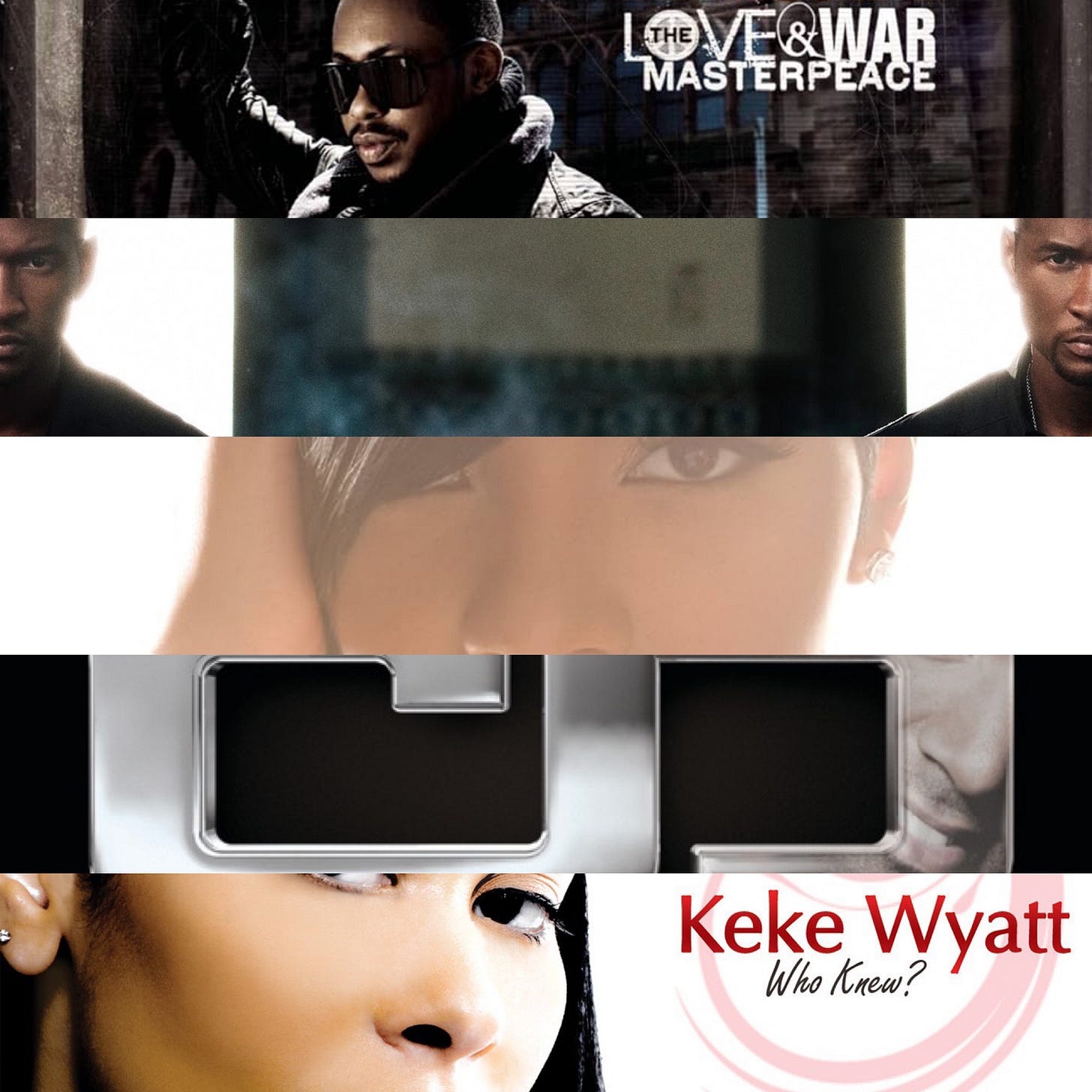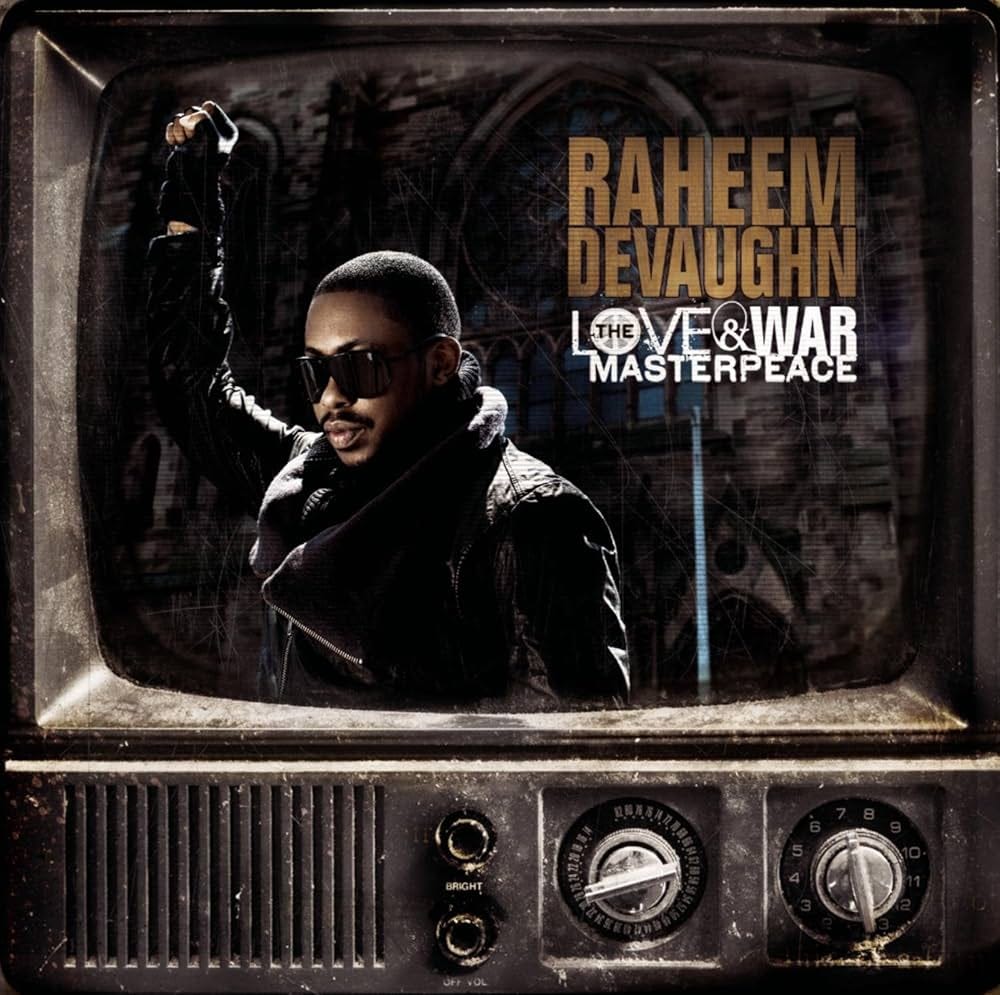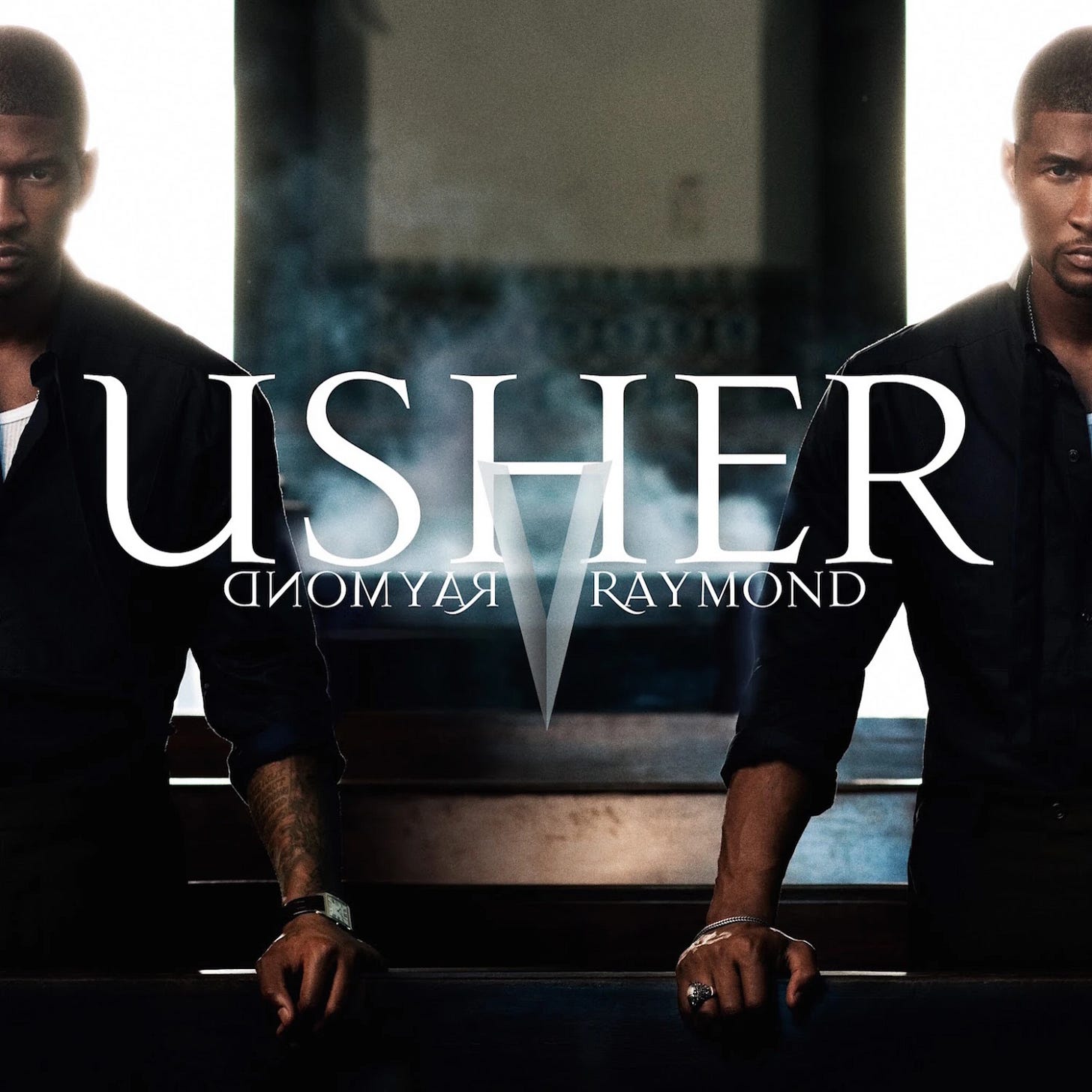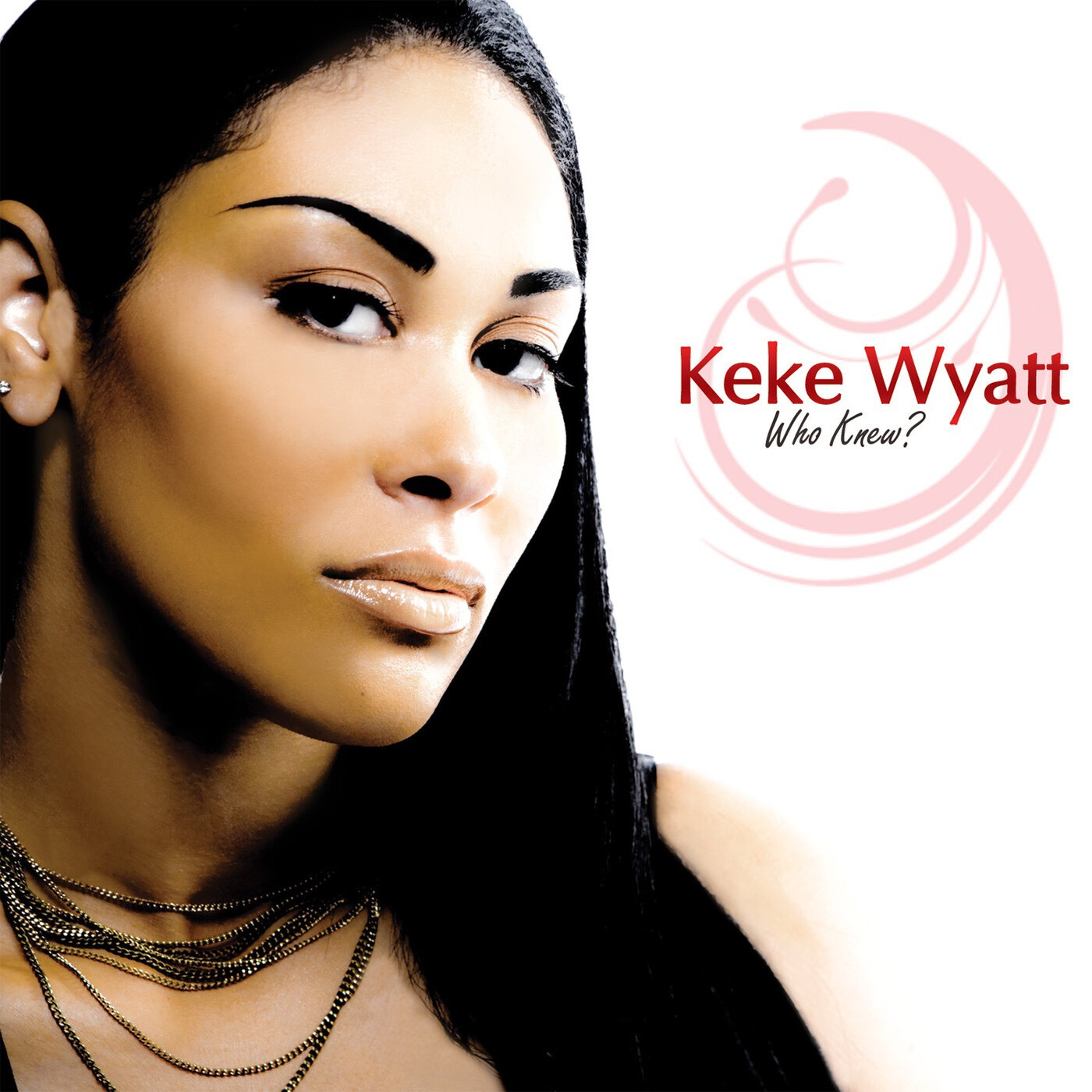Five 2010 R&B Albums That Marked the End of an Era
This was the year auto-tune stopped being a gimmick and became grammar. Every project here rewired the genre’s emotional voltage in its own dialect.
Five 2010 R&B Albums is a time-capsule series that revisits five distinct projects from a year when R&B was in flux—still tethered to radio cycles, but already bracing for streaming shifts, digital edits, and a changing industry pulse. Fifteen years later, these albums read less like trends (well, depending on the list) and more like blueprints for how artists held on to emotional directness, full-album ambition, and layered vocal craft in an era that was quietly reshaping what R&B would become.
Raheem DeVaughn, The Love & War MasterPeace
After two years, the third album, The Love & War MasterPeace, is largely composed of material created in parallel with Love Behind the Melody. At that time, it was already near completion and was said to be a very consciously crafted work. But given the strong reception to his last release, its release was postponed. Afterwards, a few retouches were added, and it has now been announced. Meanwhile, Raheem also launched his own label in his hometown, Washington, D.C., made guest appearances with Ghostface Killer and UGK, and performed at a Maze tribute event, so he did not feel absent.
This album has been released in both single and two-disc versions. Here, we will take the deluxe two-disc version (the single-disc version is the same as Disc 1 of the deluxe). The collection of tracks rests on two major pillars: as the title suggests, “love” and “war.” The latter could be broadly called “conflict,” but honestly, it gives a somewhat grandiose impression. However, there is no sense of shrillness here, and in fact, the majority of the songs are standard love songs (and love-making songs). In terms of the ratio between those and the socially conscious songs, it comes close to the debut of 2005’s The Love Experience, so there is no need to view this work as overly special. That said, whether socially or spiritually oriented, this is a work in which his consciousness stands on the same level.
Following a monologue by Professor Cornel West, the opening track, “Bulletproof,” featuring Ludacris, is a strong, socially conscious song. It uses a Curtis Mayfield piece as source material, and the song’s overall tension also evokes Curtis’s direct line. On top of that, there’s a Marvin Gaye‐style layered chorus, and together with Ludacris, he cuts into a current full of conflict. On the other hand, the DC-network connected Wale features on “The Greatness,” which turns into a light uptempo love song. With these two songs as entry points, what follows is a focus from various angles. In the love songs, the orientation of respecting women that flowed from the previous track, “Woman,” appears throughout; particularly, the track “My Wife” is a very fine song. The love-making pieces likewise include the self-referential “B.O.B.,” an oral‐type “Microphone,” and a Prince-esque sweet number “Garden of Love”—the erotic songs all carry Raheem’s style consistently. Meanwhile, a DV-style relationship is addressed in “Black & Blue,” so the two pillars mentioned earlier do intersect within the work. Among the socially conscious songs are collaborations with Damian Marley on “Revelations 2010” and with Bun B on “Wing & a Prayer,” which are powerful, but what especially draws attention is the song “Nobody Wins a War,” featuring many guests. At the end, Jill Scott's soulful reading is particularly impressive.
Most of the tracks were handled by Kenny Dope, as with the previous work. In this instance, the sonic ambition (which seems to be in Raheem’s hands in terms of how much) appears more modest than before, but by contrast, the sense of maturity is very strong, and when one confronts the message, it perhaps is more appropriate. Also, simply put, there are many good songs. Aside from the previously mentioned ones, there’s the Carvin & Ivan production “Mr. Right,” on Disc 2, there’s the house tune with up-and-coming Phil Adé on “Lose Control,” the slow jam “Calling Me,” the group R&B “XOXO”, and so on. What shines more than these is the vocal work itself. For example, the pair Ne-Yo & The Stereotypes on “I Don’t Care” is a killer track (Raheem doesn’t take songwriting credit), but what brings in the rich R&B fragrance is Raheem himself in his singing voice—a major work. — Phil
Usher, Raymond v Raymond
From the second onwards, every album has been multi-platinum, especially the 2004 Confessions (RIAA-certified Diamond), with ten million sales, which stands as a monster, leaving Usher almost alone running the star path among male R&B singers. However, a shadow seemed to fall on that rising slope with the previous work, Here I Stand. Mariah Carey, whose 2005 album sold over six million, fell into the millions in 2008 and went gold in the following year; similarly, Here I Stand only reached just over a million. That said, at big events such as the Obama inauguration concert, the Michael Jackson memorial service, the Grammys Michael tribute, “We Are the World 25 for Haiti,” etc., Usher appears in the best form each time, so it’s also true his shine shows no sign of dimming. There may be countless young R&B singers whom Michael would follow, but there is none who can overshadow Usher at the moment.
The sixth studio album was to be released comparatively soon after the previous one (initially planned for last year); the frustration towards not achieving sales worthy of his outstanding profile in his scene drove this. The main cause of the slowdown in growth is, implicitly, the industry’s CD sales slump, but he and the label cannot settle for that. The work, tentatively titled Monstar after the Dustin Hoffman & Meryl Streep divorce-family film Kramer vs. Kramer, was retitled Raymond v. Raymond. In other words, it implied a push into personal territory around his own divorce, but in fact, apart from the song “Papers” (about a divorce certificate, penned by Sean Garrett) and “Guilty” featuring T.I., the rest are mostly seduction songs, and the album did not become overly heavy. Even with those tracks, it weaves a man’s sadness into a fading melody yet gives a refreshing finish—the skill here is quite vivid.
On the sound front, will.i.am introduced electro four-on-the-floor disco and auto-tune on “OMG”; Black Elvis’s production on “Lil Freak” features a riff full of the influence of Stevie Wonder’s “Living for the City”; Danjahandz’s dark futuristic funk on “So Many Girls”; Jimmy Jam & Terry Lewis’s Minneapolis funk (with the help of Avila Brothers and Miguel) style on “Monstar”; these and more producers cast light from all sides to bring out Usher 2010. Some of these lean towards sound over substance, but there are tracks like “Hey Daddy (Daddy’s Home)” in which the upswing still brings out Usher’s vocal charm at maximum. Mid- and slow-tempo remain excellent as usual, and in “Okay” (produced by James Lackey), his dense vocal expression with falsetto is irresistible for R&B junkies. Trying advanced expression on one hand and classical soul on the other is his main road. He faces the scene straight on, he strikes the next move not with quirks but with the orthodox, and he lets his man-voice resound. Honest to the point of being blunt. He is doing what he should. — Tai Lawson
Monica, Still Standing
Having turned 30 and aware of his own milestone, Monica compiled her sixth album, which spanned roughly four years. As a reality show depicting daily life as a mother of two children and non-daily life as an artist began in October 2009 on BET, titled Still Standing, it was already hinted that she would aim for a different position as a talent, but basically, the musical direction has not yet been affected. The proportion of messages about female independence or strong living may have increased, but the biggest change may be that these topics have now become grounded. However, the overall tone and taste of the album are wonderfully soulful, and the calibre of the tracklist is consistent, so, in that respect, it could be one of her finest albums.
Anyhow, the tracks produced by Missy Elliott, “Everything to Me,” Ne-Yo-composed “Stay or Go” (produced by Bei Maejor and Ne-Yo), and Los da Mystro’s “One In a Lifetime” are extremely strong. On the R&B chart, the number one hit “Everything to Me” is almost like a re-singing of Deniece Williams’s “Silly,” and this “Silly” atmosphere matches Monica very well. Frankly, when the hook begins a cappella and then transitions to the main track, I am completely sold. The sense in Missy’s decision to shape the song that way is real. “Stay or Go” is, as expected of Ne-Yo, a sweet song style that is his strong suit, and if you like Ne-Yo, you can expect it with confidence. “One In a Lifetime” is, contrary to the luring mood, built on a solid downbeat, somewhat reminiscent of Holiday’s “Bed.” Yet the unusual groove draws out Monica’s resilient voice, and, through the synergy, one feels the song itself takes on presence without question.
In the ballad sector, the addictive Polow da Don production “Here I Am” stands out, as well as the orthodox Bryan-Michael Cox production “Superman”, and the Stargate-romantic “Believing In Me—all top-class. In particular, “Love All Over Me” features a hook reminiscent of Norman Connors’s “You Are My Starship,” allowing full savour of soulful Monica. With this content, if there had been even one more explosive dance tune like “Everytime tha Beat Drop” from the previous album, one might think “if only,” but by deliberately skipping an obvious party-tune and selecting only eleven tracks, the album’s genuine punch emerges. Her refusal to chase a hit by overly pandering to trends or becoming artist-less through pop tilt instead speaks to her inner richness, and I find that very reassuring. — Keziah Amara Reid
Craig David, Signed Sealed Delivered
Hmm, on paper, this one looks like it will sell, right? While Jay Sean, Taio Cruz, etc. from the UK are scoring success in the US, what the pioneer Craig will do interests me—and this is how he comes! The title, a reference to the Stevie Wonder classic, shows that the work is centred on covers of soul classics from Motown. With about ten years in the industry and still only 28 years old, though one might think “acting like a veteran,” yet as the “2-step prince” he debuted as, I wondered if he’d do the covers in a grime-ish sound? My expectation was spectacularly shattered. The two UK pop-based producers, Jerry Abbott and Grant Black, produce everything; the club-edgy sound is almost absent, and the tone is very pop. But on the tracks “One More Lie (Standing In the Shadows)” and “All Alone Tonight (Stop Look Listen),” the former samples The Four Tops, the latter samples Marvin Gaye & Diana Ross (originally The Stylistics), with lyrics changed by Craig himself, giving a sense of originality. Also, his fresh, clear singing voice delivers the well-known songs of the Temptations, Marvin Gaye, and Otis Redding in a way different from the usual covers—extremely comfortable as a “now-sound.” Therefore, as I wrote above, “looks like it will sell,” and if it does, I feel it may trigger a new cover-boom. — Seraphina Joy Clarke
Keke Wyatt, Who Knew?
Released in 2001, the debut album Soul Sista of Keke Wyatt was overshadowed by the 2002 incident in which she stabbed her husband and became entirely famous. Thanks to that incident (?), the album’s sales rose due as the news, but whether the incident had an influence or not, her subsequent artistic activities were by no means smooth. After drifting through Cash Money and TVT, her albums were shelved for a long time. This new work, too, was announced long ago but showed no sign of releasing—the hand reaching out was Shanachie, one of the most dependable labels today. The label’s sure aesthetic sense shown in the works by Leela James is proof, and this work’s quality is also excellent—you’ll repeatedly think “that’s Shanachie.”
This work is decided as a keeper just by looking at the producers’ lineup—Underdogs, Steve Russell, Tank, and others. But every song is a melody-heavy, heartfelt number, and for R&B fans, this is one disc they will definitely accept. A noticeable feature is that many songs have a ‘90s R&B taste: the heart-aching melody “Without You,” the Steve Huff-written “So Confused” (the voice and vibe evoke Faith Evans). The song “Never Give Up,” which uses the same sample as “I Love You” and was written by Huff, who backed Keke in her debut, is a prime example. The uptempo “Getting It” seems almost unnecessary, but removing it still leaves you with a decent album—no mistake. — Imani Raven







